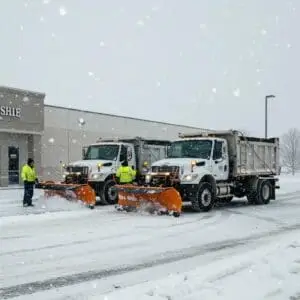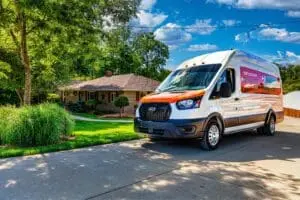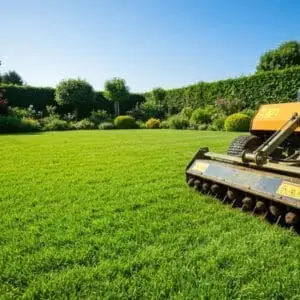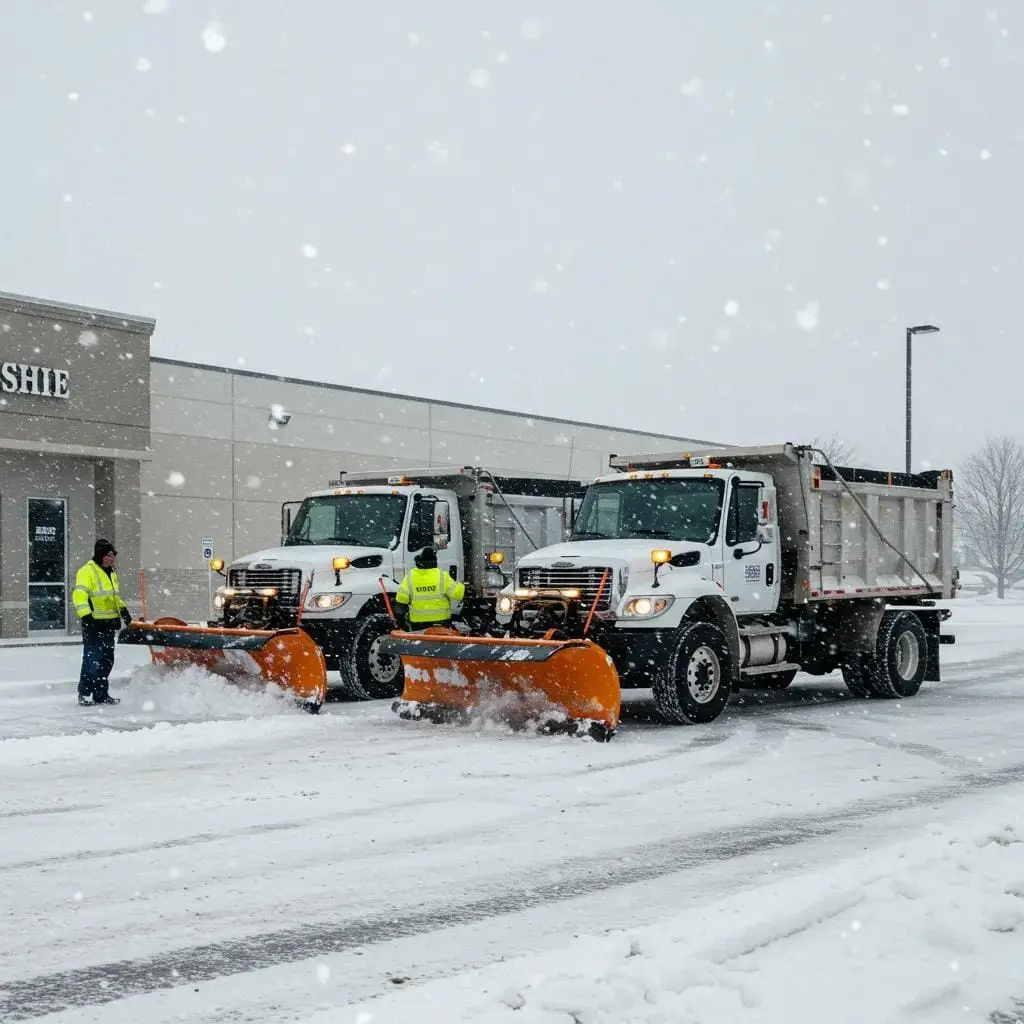
Easy Snow Removal for Businesses in Steubenville and the Ohio Valley
Commercial snow removal, including essential commercial plowing service, means getting rid of snow and ice so your company stays safe and open during winter storms. Professional teams use special tools, de-icing chemicals, and smart plans to keep your business running smoothly. This article will show you how commercial snow removal helps prevent slips and falls, protects your customers and employees, and makes sure deliveries and work continue even with snow and ice.
You’ll learn about the different services available—like plowing, using liquid or salt de-icers, clearing sidewalks, and hauling snow away. We’ll also explain how contracts work and what local things matter for properties in Steubenville, Wheeling, and the Ohio Valley. We’ll cover the equipment and tech that make service faster and clearer, compare common contract types, and answer questions business managers often ask when picking a snow removal company. Read on for helpful tips, comparisons, and advice to help you choose the best commercial snow removal for your business and get a free quote from a local company.
Why Businesses Need Professional Commercial Snow Removal
Professional commercial snow removal is important because it stops injuries, lowers your legal risks, and keeps your business open even in winter weather. By plowing on time, pre-treating surfaces, and using de-icers, professional crews help prevent slips, falls, and car accidents that can lead to lawsuits and lost money. Keeping parking lots, driveways, and walkways clear also makes your property look good and ensures employees and customers can get in during important business hours. The next parts explain how safety, record-keeping, and staying open are connected, and what businesses should look for in their service.
Commercial snow removal makes places safer and lowers legal risks by getting rid of the main dangers that cause slips and car crashes. It also helps by keeping records with dates and photos of the work done. Doing things ahead of time—like pre-treating before a storm and de-icing right after—stops black ice and packed snow that cause slips. These records can be used as proof if there’s an insurance question. Also, good materials and proper use mean less damage to surfaces while making them less slippery. You should expect clear promises about how fast they’ll respond based on how much snow falls. This leads to how businesses stay open with guaranteed service.
Good snow and ice management helps your business stay open by making sure employees, customers, and emergency services can get to your building without delays. Quickly clearing main roads and important areas—like entrances, loading docks, and paths for people with disabilities—means fewer missed deliveries and lost sales during storms. Contracts often include things like guaranteed response times, priority scheduling, and plans for bad weather. Knowing these features helps you pick a service level that fits your business’s needs and how quickly you need to recover from a storm.
How Commercial Snow Removal Makes Your Business Safer and Lowers Legal Risks
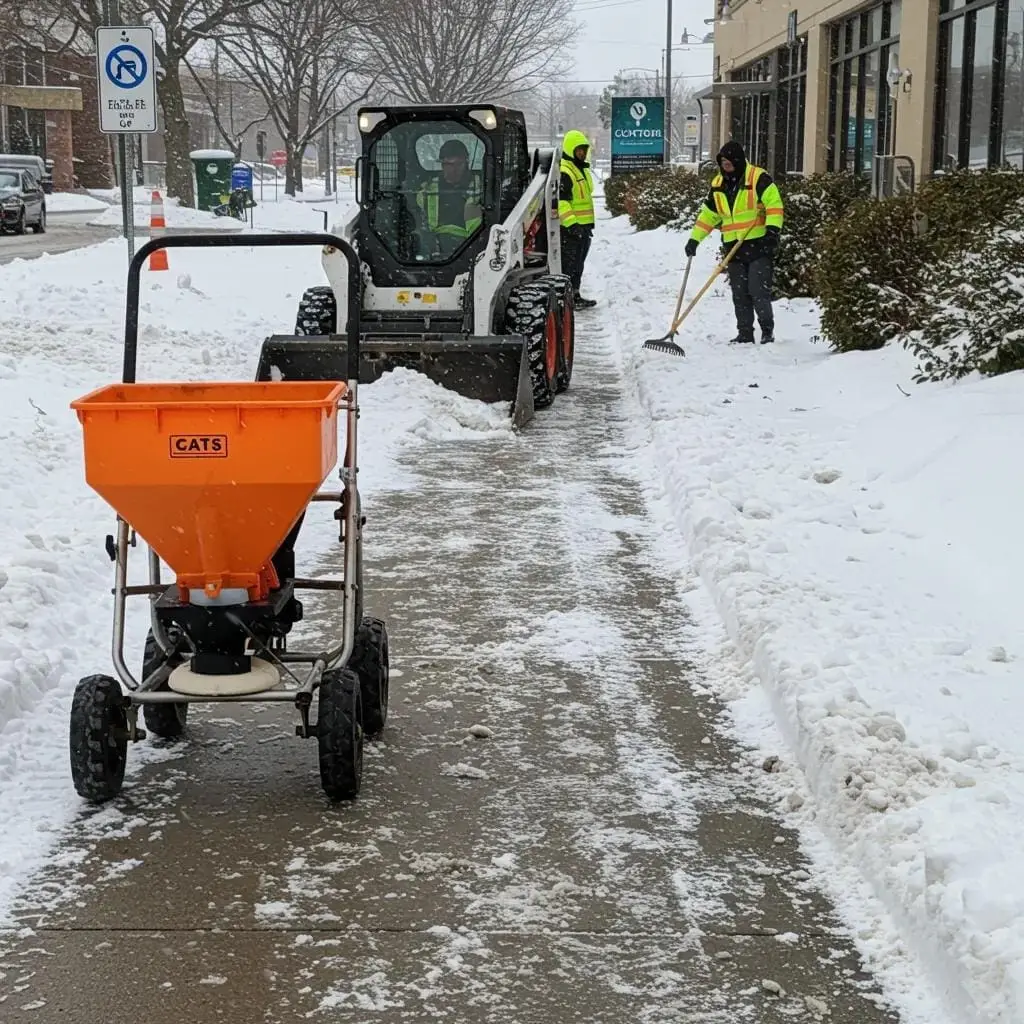
Professional commercial snow removal makes places safer mainly by getting rid of dangers like slips, falls, and car crashes through regular clearing and proper de-icing. It also uses documented steps to show you’ve taken care of your property. Crews first clear important areas—like entrances, ramps, and busy sidewalks—then apply de-icer carefully to stop ice from forming again. They usually keep records with dates and photos of their work, which helps if there are legal questions or insurance claims. Having clear rules about how fast they’ll respond based on snow levels (for example, two inches of snow, or any snow for “zero-tolerance” contracts) helps both you and the snow removal company know what to expect. This helps you choose the right type of contract.
How Good Commercial Snow Removal Helps Your Business Stay Open
Good snow and ice management helps your business stay open by keeping important entrances clear, protecting your supply chain (how goods get to you), and stopping shutdowns that cost you money. For stores and service businesses, clear parking and walkways mean customers can visit safely. For factories, clear driveways and loading docks keep deliveries moving in and out. Reliable service means less downtime and lets managers plan staff confidently during winter. Choosing contract features like guaranteed response times and emergency plans helps keep your business running and lowers the risk of it stopping due to bad weather.
What Snow and Ice Removal Services Do We Offer for Businesses?
Full commercial snow and ice removal includes many services that work together—like plowing parking lots, moving or hauling snow, using salt and liquid de-icers, clearing sidewalks and paths for people with disabilities, and cleaning up after storms. Each service is used based on your property type and what’s most important for your business. Crews pick the right equipment and materials for the surface, slope, and drainage of your property. The table below compares our main services, the tools we use, and when each is best for businesses.
Different commercial snow and ice services use specific tools and response times to fit your property’s needs.
| Service | Main Equipment | Best For |
|---|---|---|
| Parking lot plowing | Big plow trucks | Quickly clearing snow from lots and driveways |
| Liquid de-icing & pre-treatment | Tank trucks with sprayers | Stopping snow/ice from sticking to pavement, great before a storm |
| Sidewalk clearing & salting | Small loaders, walk-behind blowers, hand crews | Entrances, paths for people with disabilities, and busy walkways |
| Snow hauling/relocation | Dump trucks, loaders | When there’s too much snow or it blocks views |
This comparison shows which services are used depending on the size of the storm and your lot’s limits. Here are short descriptions of each service:
- Parking lot plowing: Quickly clears snow from lanes and parking spots to help cars move and park easily.
- De-icing and pre-treatment: Uses liquids and carefully measured salt to stop ice from forming and make surfaces less slippery right away.
- Sidewalk and entrance clearing: Focuses on clearing these areas to keep people safe and allow access for those with disabilities at main building entrances.
- Snow hauling and relocation: Physically removes snow and takes it off-site for properties with little space or when you need all parking spots back.
These services work in order—pre-treatment, plowing, targeted de-icing, then hauling if needed—to keep your property working and safe throughout the winter.
Bradley Lawn-Scape offers local commercial snow removal and ice control for companies across the Ohio Valley. We provide on-call plowing, de-icing, and sidewalk services with free quotes for custom plans. As a local, family-focused company, Bradley Lawn-Scape plans out how to use its trucks and uses weather forecasts for pre-treatment to cause less trouble for you. To get a free, no-pressure estimate for your property, contact Bradley Lawn-Scape by phone or email to set up a visit and get service advice.
What’s Included in Our Commercial Snow Plowing Service?
Commercial snow plowing clears parking lots, driveways, access roads, and important areas like delivery lanes and handicap spots. We can also push snow back or haul it away depending on how much space your lot has. How fast we respond is usually set in the contract and depends on how much snow falls—like a certain number of inches or a “zero-tolerance” rule that means we act right away. We typically use heavy-duty plow trucks for main roads and smaller machines for tight turns and curbs. Our clearing plan usually focuses on entrances and busy areas first, then moves to cleaning parking spots and treating surfaces to stop ice.
How We Handle Ice with Special De-icing Solutions
Ice management uses special liquids for pre-treatment and carefully measured salt. These are chosen based on the temperature, what kind of surface they’re used on, and environmental concerns. They help stop ice from forming and breaking the bond between ice and pavement. Liquid pre-treatments used before a storm make it harder for snow to stick. After a storm, salt or liquid anti-icers are used to deal with refreezing and any slippery spots left. Each product is picked to work well while also being mindful of corrosion and runoff. The best way is to use a few steps—pre-treatment, plowing, then spot de-icing—which uses less salt but keeps surfaces safe and in good shape.
About De-Icing Chemicals
Getting rid of snow and ice in winter uses a lot of chemicals. It’s important to know how these chemicals affect the environment. Studies look at how well different de-icing chemicals work, how much they cost, and their environmental impact. These chemicals can change the soil, affect water, and might even pose health risks. We use this information to make smart choices about which chemicals to use.
Why Clearing and Salting Sidewalks Is So Important for Businesses
Clearing and salting sidewalks keeps people safe, makes sure your business follows rules for people with disabilities, and helps customers have a good experience by keeping entrances and walkways clear during and after storms. We focus on clearing building entrances, ramps, emergency exits, and paths to public transport or parking that many people use. When salting walkways, we use smaller, controlled amounts to balance making them less slippery with protecting the surface and reducing runoff. Hand crews or smaller machines allow us to treat steps and tight corners carefully. Keeping these walking areas clear lowers the risk of slips and falls and helps your business stay open without problems.
When Do We Need to Haul Away Snow for Your Business?
Snow hauling is needed when there’s too much snow on your property, when piles of snow block views or emergency paths, or after big storms that make parts of your parking lot unusable. When deciding to haul snow, we think about permits, where to take the snow off-site, the cost of hauling versus just pushing it around, and how long you need the space back. Hauling is usually done after the main plowing and de-icing to get all parking spots back and stop snow from drifting due to wind. Thinking about hauling needs early in the season helps you plan for possible costs after large storms.
How Custom Snow Plans and Contracts Help Your Business
Custom snow management plans and contracts turn business risks into clear service plans and costs. They set rules for when we come, how fast, and what services are included, all based on your property’s needs. You can choose between seasonal agreements, paying per storm, or “zero-tolerance” plans. This lets managers balance how predictable costs are with how much service is guaranteed and how much legal protection you get. Clear contract language about when service starts, emergency plans, materials used, and records kept helps avoid arguments and ensures reliable service during important storms. The table below compares common contract types and what they usually include to help you pick the best one.
Common contract types differ in how predictable they are, how they charge, and what service they guarantee.
| Contract Type | When Service Starts & How Fast We Respond | How We Charge |
|---|---|---|
| Seasonal | Set coverage for the whole winter with clear response times | One flat fee for the season |
| Per-Event | Service starts when a certain amount of snow falls per storm | Pay each time we come or by the hour |
| Zero-Tolerance | Any amount of snow means we respond right away | Higher price with top priority scheduling |
- Seasonal contracts give you a clear budget and continuous service all winter for places that need regular help.
- Per-event contracts offer flexibility and cost less upfront, good for properties that don’t need snow removal often.
- Zero-tolerance contracts mean the fastest response and constant readiness for high-risk places like hospitals or busy stores.
Pick the contract type that matches how much risk you’re willing to take and what your business needs. Next, we’ll talk about common contract setups and who benefits from each.
Bradley Lawn-Scape offers contract options made for commercial properties in the Ohio Valley, including seasonal plans, per-event agreements, and zero-tolerance service levels. Property managers can ask for a free, custom estimate to talk about specific triggers, response times, and prices. Contact Bradley Lawn-Scape by phone or email to get a property assessment and a free quote that shows recommended contract terms and expected service levels.
What Are Seasonal and Per-Event Commercial Snow Removal Contracts?
Seasonal contracts cover a set winter period and usually include regular clearing, fast help, and one flat price. This makes budgeting simple for businesses with steady traffic. Per-event contracts charge based on each storm, often by the visit or a flat rate per event. These are good for places with changing winter needs or smaller budgets. Seasonal plans fit shopping centers, schools, and places that must always be open. Per-event is useful for smaller properties and when it doesn’t snow often. When choosing a contract, think about how often it snows, how much downtime you can handle, and how important guaranteed response times are.
How Does a “Zero-Tolerance” Commercial Snow Removal Plan Work?
A zero-tolerance plan means we respond to any amount of snow, often with the highest priority and fastest response times to keep access constant and lower even short-term risks. This plan usually costs more because it guarantees we’ll be there and constantly watching, but it’s right for medical sites, assisted living homes, and places with high legal risks. Contracts explain what “measurable” snow means, how fast we’ll respond, and what to do in emergencies. Understanding these terms helps managers decide if the extra cost is worth the lower risk and uninterrupted business.
Where Do We Offer Commercial Snow Removal in the Ohio Valley?
Our commercial snow removal in the Ohio Valley focuses on areas in and around Steubenville, Ohio, and Wheeling, West Virginia. We know the local weather, city snow rules, and common types of properties. Local companies can plan routes, staging areas, and response times better because they understand regional weather and salt rules. This makes service more efficient and faster than non-local companies. Below are examples of local service considerations and a short list of common service areas.
Knowing the local area gives businesses an advantage.
- Properties in the Steubenville area benefit from our knowledge of city timing and downtown delivery schedules.
- Clients in the Wheeling area get custom plans that consider the steep hills and water flow common there.
- Nearby suburban and industrial parks often need special plans for hauling snow away to get full capacity back.
These local adjustments mean fewer delays and better service quality. The next parts describe services made for Steubenville and Wheeling customers.
What Commercial Snow Removal Services Are in Steubenville, Ohio?
In Steubenville, services often include clearing downtown sidewalks first, planned parking lot plowing for shopping areas, and hauling snow for factories with little storage space. Our local crews work around city snow removal schedules to avoid problems and clear areas at the best times for customers. Property managers should think about seasonal contracts if keeping access open during business hours is super important. Per-event contracts might be enough for properties with less traffic. For exact advice and a free quote for Steubenville properties, contact a local provider to set up an on-site visit.
How We Help Businesses with Commercial Snow Removal in Wheeling, West Virginia
In Wheeling, service plans often deal with steep hills and drainage patterns that affect how snow builds up and refreezes. So, crews pick equipment and de-icers that work best for those conditions. Services focus on clearing entrances and exits on sloped driveways and treating busy walking paths to stop refreezing in shaded spots. Factories and medical places in Wheeling often choose higher service levels to stay open without interruption. Property managers benefit from a custom plan that addresses their specific terrain and weather exposure. Reach out for a personalized check-up and free estimate to match service to your property’s needs.
How Bradley Lawn-Scape Makes Commercial Snow Removal Safe and Reliable
Making sure commercial snow removal is safe and reliable depends on good equipment, technology for tracking and sending crews, experienced workers, and careful records and quality checks. A dependable plan includes keeping trucks in good shape, using GPS to track trucks for transparency, watching the weather for early pre-treatment, and trained crews who follow safety rules. The table below lists common equipment, what it’s good at, and what it’s mainly used for, so you can understand how our tools help us do a good job.
Equipment and technology details show their purpose and expected results.
| Equipment | What It’s Good At | Main Use |
|---|---|---|
| Heavy plows (truck-mounted) | Clears a lot of snow quickly | Main parking lot lanes and heavy snow |
| Salt spreaders | Applies salt carefully | Helps with traction and melts snow at certain temperatures |
| Skid-steer loaders | Can move easily in tight spots | Clearing around curbs and islands |
| GPS fleet tracking | Shows real-time location & best routes | Faster sending of crews, clear tracking |
What Tools and Tech Do We Use for Snow and Ice?
Good snow and ice management uses big plow trucks for main clearing, smaller skid-steer loaders for islands and tight spots, carefully set spreaders for applying materials correctly, and liquid spray systems for pre-treatment. Technology like GPS tracking for trucks, route planning, and weather monitoring tools helps us send crews out early and lets property managers see where crews are and how they’re doing. Regular maintenance for equipment and checking that spreaders are set correctly keeps things reliable and ensures materials are applied consistently. These practices make response times faster and improve accountability, which helps with our quality checks.
How Skilled Crews and 24/7 Watching Make Our Service Better
Experienced crews know what to do—like when to just push snow or when to haul it away—and follow safety and communication rules to lower risks. Watching the weather and crews around the clock means we can quickly send out help and make changes if forecasts change or storms get worse. This helps us stick to our promised response times. Our quality checks include looking at the property after service, keeping records with dates, and telling customers what work was done and if anything still needs attention. Together, skilled crews and constant monitoring ensure reliable service and good communication during winter events.
Common Questions About Commercial Snow Removal
This section answers common questions business managers ask about what’s included, costs, emergency help, equipment, and choosing a company. The answers are short and focus on the practical details you need. After this, we’ll tell you how to get a free, custom quote from a local provider.
What’s Included in Commercial Snow Removal Services?
Commercial snow removal services usually include plowing parking lots, clearing main paths, sidewalks, and entrances, using de-icers, and, if you pay for it, hauling snow away to get all your space back. Contracts should clearly state what areas are covered, when service starts, what materials are used, and anything that’s *not* included—like roof snow removal or inside sidewalks—so there are no surprises when you get the bill. Make sure records and post-service reports are included to help with legal protection. For an exact plan and free property check, contact Bradley Lawn-Scape to discuss services that fit your property’s layout and needs.
How Much Does Commercial Snow Removal Cost in the Ohio Valley?
Cost changes based on property size, how often you need service, how fast we respond, if snow needs hauling, and what materials we use. Seasonal contracts usually turn changing storm costs into one flat fee, while per-event pricing charges by the storm or by the hour. Travel distance, how complex your lot is, and environmental limits also affect the price. Big storms that need hauling or extra crews will increase costs. Because of all these things, a free property check gives you the most accurate estimate for your property. To get a custom, free quote for your site in the Ohio Valley, reach out to Bradley Lawn-Scape by phone or email.
Do Commercial Snow Removal Companies Offer Emergency Help?
Yes, many companies offer emergency help with set response times, and you can add emergency service to your contract for faster dispatch. Emergencies often mean blocked entrances, public safety concerns, or fast-falling snow that threatens your business. Contracts might have higher fees for emergency calls. Having 24/7 monitoring in place makes it more likely you’ll get a quick response. Including emergency clauses in your agreement ensures you have a clear plan for when conditions demand fast action.
What Equipment Is Used for Commercial Snow and Ice Removal?
Typical equipment includes big plows on trucks for main lanes, smaller plows for wide areas, skid-steers for islands and tight corners, salt spreaders with careful controls, liquid de-icer tanks, and dump trucks for hauling. The equipment chosen matches the property size and layout: bigger lots need high-capacity plows, while walkways need smaller, precise machines or hand crews. How well equipment is maintained and how accurately spreaders and liquid systems are set affects how consistent the application is, which impacts both safety and surface protection. Knowing a company’s trucks and maintenance plan helps you guess how reliable their service will be.
How to Pick the Right Commercial Snow Removal Company?
Choose a company by checking their insurance and references, making sure they have enough trucks and equipment, seeing if they know the local area and similar properties, and reading their contract carefully to understand when service starts, how fast they respond, what materials they use, and what records they keep. Ask for example service logs, how they handle de-icers for the environment, and what happens in big storms. Use a short checklist when comparing bids to make sure you’re comparing similar offers.
- Check that the company has the right insurance and can give local references.
- Confirm that the service agreement includes clear rules for when service starts and how fast they respond.
- Check their equipment types, how they maintain it, and how they keep records.
This checklist helps you compare offers and find companies that can meet your property’s needs for staying open and managing risks. For a free, custom quote, contact Bradley Lawn-Scape to set up a property visit.
Get a Free Commercial Snow Removal Quote Today!
To request a free, no-pressure commercial snow removal estimate for properties in Steubenville, Wheeling, or anywhere else in the Ohio Valley, contact Bradley Lawn-Scape by email at [email protected] or by phone at 740-264-2597. Our team will schedule a visit to your property, discuss recommended service levels and contract options, and give you a written plan made for your property’s needs and budget.
Frequently Asked Questions
What to Think About When Choosing a Commercial Snow Removal Contract?
When picking a commercial snow removal contract, think about how often it snows in your area, the size and shape of your property, and your budget. Decide which type of contract fits you best—seasonal, per-event, or zero-tolerance. Also, check the service guarantees, how fast they respond, and what services are included. Knowing what’s most important for your business and how much risk you can handle will help you choose a contract that works for you and ensures good service all winter.
How to Get Your Property Ready for Winter?
To get your property ready for winter, start by checking your site well to find busy spots and possible dangers. Make a snow management plan that includes regular maintenance, important areas to clear first, and clear talks with your snow removal company. Make sure your contract includes plans for pre-treatment and quick response to snow. Also, think about putting up signs to warn customers and employees about winter conditions, making things safer and easier to access during storms.
What About the Environment and Commercial Snow Removal?
Environmental concerns in commercial snow removal include the kind and amount of de-icing stuff used, because these can affect soil and water quality. Choose eco-friendly de-icing products that cause less harm to the environment while still keeping things safe. Also, make sure your snow removal company follows good practices for applying materials to reduce runoff and corrosion. Regularly check how your snow management plans affect the environment and think about using methods that are good for the planet while still handling snow and ice well.
What to Do During a Big Snow Storm?
During a big storm, it’s key to have a plan ready for commercial snow removal. Talk with your snow removal company to make sure they’re ready for more work and can send out crews quickly. Clear main access routes and busy areas first, and be ready for possible delays in service due to bad weather. Keep talking with your company to get updates on their progress and any changes to the schedule as the storm continues.
What to Expect from a Commercial Snow Removal Company?
When hiring a commercial snow removal company, expect them to be professional, communicate well, and follow safety rules. A reliable company should offer a clear contract that explains services, response times, and prices. They should also have the right equipment and trained people to handle different snow conditions. Look for companies that keep records of their work with dates and photos, which shows they are open and responsible. Regular updates during winter events are also important to keep you informed about service progress and any changes.
How to Check if Your Commercial Snow Removal Service Is Good?
To check if your commercial snow removal service is good, watch things like how fast they respond, how good the service is, and what customers say. Look at the records the company gives you, including logs and photos, to see if they followed the contract rules. Do regular checks of your property after snow events to find any areas that need improvement. Also, keep talking with your company to discuss how they’re doing and fix any problems quickly, making sure your snow management plan works well all winter.
Conclusion
Hiring pros for commercial snow removal keeps your place safe and open in winter, lowering risks and making customers happy. With custom solutions that include timely plowing, de-icing, and sidewalk clearing, you can keep your business running and protect its professional look. By choosing a reliable company like Bradley Lawn-Scape, you can expect a commitment to quality and safety that meets your specific needs. Contact us today for a free, no-pressure quote to find out how we can help with your winter management plan.

